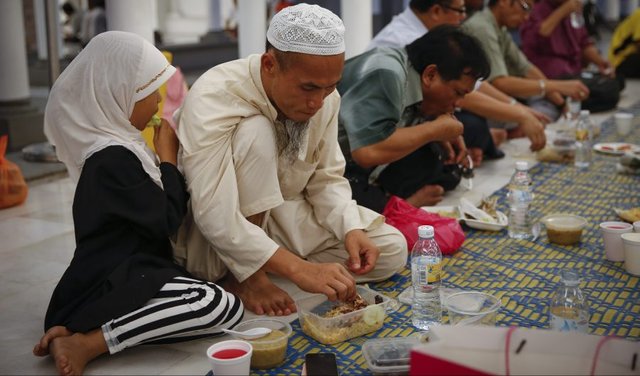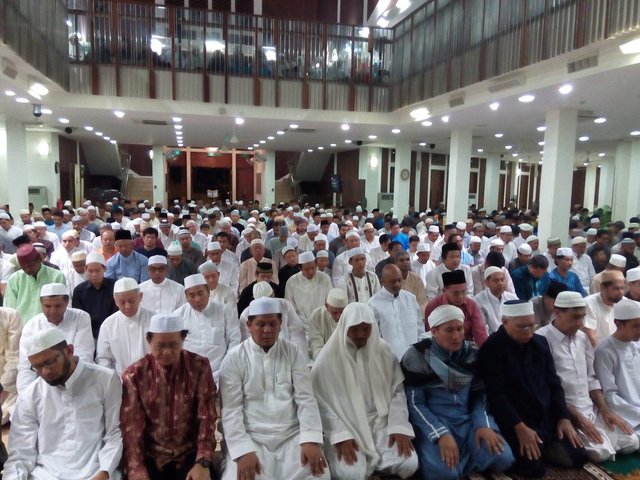Ramadan: The practice of Jihad during the holy month
Ramadan, the holy month of Islam, is not only marked by the act of fasting but is also about showing compassion towards others and reflecting upon one’s own spiritual well-being.

AL ARABIYA
SINGAPORE – Ramadan, the ninth month of the Islamic calendar, started on May 26 this year. The holy month of Ramadan symbolises a time of abstinence for Muslims around the world who fast from sunrise to sunset.
For many in Singapore, Ramadan is when their Muslim friends stay away from food and drinks, and when the Geylang Serai Bazaar comes to life.
However, Ramadan signifies more than just a period of fasting for Muslims. During Ramadan, Muslims not only refrain from eating or drinking but also sexual activity, smoking and vulgar behaviour. Patience, moderation and compassion are also practised throughout the holy month.
So why do Muslims fast during Ramadan? Firstly, the act of fasting is not confined within the period of Ramadan itself and is encouraged outside of the month. However, Ramadan marks a time of reminder for Muslims to attain piety and practise the pillars of Islam. Fasting represents one of these pillars.
Later in the evening, special prayers called terawih are performed usually in large groups in mosques across the country. These prayers can also be performed at home with family members or alone. More emphasis is placed on prayer during Ramadan which signifies strengthened spiritual belief and gratitude to God.

PHOTO: Pinterest
THE PRACTICE OF JIHAD
The arabic term jihad means ‘to strive’ or ‘to struggle’ to perform God’s commands to one’s best ability. Jihad is broad, has multiple layers of meaning and is a core teaching in Islam.
The practice of jihad is encouraged during Ramadan but in different forms. One of these forms is striving against one’s own selfish desires. As part of abstinence, the subjugation of selfish desires is encouraged during Ramadan.
Contrary to this, groups such as the Taliban and ISIS promoted the falsely labelled idea of violence and martyrdom during Ramadan as a call to jihad.
Recently on May 30, a car bomb detonated by ISIS killed families in Karrada, a city in Iraq, outside an ice-cream shop while they were breaking fast. A similar incident killed hundreds in Baghdad during Ramadan last year. The Middle East usually suffers from an increase in terror attacks during the holy month. This is in addition to the violent acts that took place in Manchester and Jakarta earlier this month, close to the start of Ramadan.
In the case of extremists and self-proclaimed Islamists, this could be possibly due to the misinterpretation of the term jihad. They may interpret a different type of doctrine from this term, which can be erroneously perceived as struggling against a hostile enemy. As Ramadan is the time to strengthen one’s beliefs in Islam, these terror groups are taking advantage of their misinterpretation of the term to commit violent acts.
“In fact, even though the term jihad is repeated 41 times in the Quran, most of the references were made to a broader aspect of things and not just a war. Even controlling our desires and trying our best to be a better person is considered to be a jihad.”
– RELIGIOUS REHABILITATION GROUP MEMBER, USTAZ MOHD YUSRI YUBHI
It is forbidden and haram for a Muslim to take an innocent life. In the Quran, it is written that ‘whoever kills a soul unless for a soul or for corruption (done) in the land – it is as if he had slain mankind entirely’. ISIS and other terror groups’ actions have been contradictory to this teaching in the Quran as shown by their attacks on civilians which they claim to be jihad against enemies of the faith.
Their actions not only claim lives but also unthread the delicate social fabric in multi-racial and multi-religious communities all around the world. The recent deaths of two men in Portland who defended girls wearing hijabs, show how paranoia and a lack of understanding can lead to violence between people from different communities. Jeremy Joseph Christian hurled racist remarks against the girls on the train and eventually stabbed three men who tried to intervene.
It would be naive to dispel the possibility that violence fuelled by misdirected hate could happen in Singapore in the near future. With terror groups encroaching nearby in Southeast Asia, fear may overcome the racial harmony we have painstakingly built in this little red dot over the past decades.